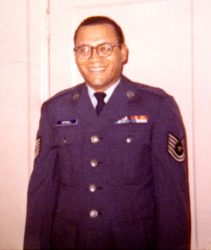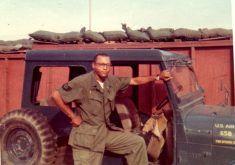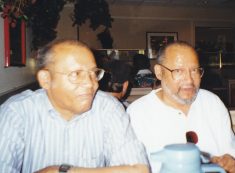What Makes A Leader; What Dad Showed Me
Posted by Mitch Mitchell on Nov 21, 2016
Today would have been my dad and his twin brother's 85th birthday if both were alive. I think about Dad often, but the times I really think about him are the day he passed away and the date he was born. I always have good memories of him, and the leadership lessons I learned just from observing him and observing situations that involved him.

|
There are many ways to describe what good leadership is about, or how it works. There are many different directions people will go in to be a successful leader. There is no one way that works for everyone, whether you're the person who's the leader or the person who's being led. But there are some principles that stand out if you're paying attention and hoping to be a good leader at some point in your life.
There are always a few items that need to be thought of as absolutes if someone is going to be an effective leader. I have one main item that, in my opinion, is number one, above everything else that anyone may think. Of course people are always free to debate this, but this is mine, and I get to it by way of a story involving Dad.
He was in the military for 26 years. He started his military career on his 17th birthday, spent 2 years in the army (because black people weren't allowed into the air force, which is where he actually wanted to be), left for about 6 months, then enlisted in the air force (thanks to Harry Truman) and stayed for another 24 years. If he hadn't had to retire because of military regulations he would have been a career military man.
Dad always had one goal when he decided to go into the military the second time around; to become a master sergeant. For many people that might not have seemed like such a lofty goal, since officers get all the press, but military life isn't what most people think it is.
There are many qualifications for people to become officers, and it's not always dependent upon whether you're the smartest or brightest. Some officers are folks that came right out of military school. Some officers are folks who got a college degree, made it through basic training, and had a job skill that automatically made them an officer. If anyone watched the TV show Mash, you'll remember that the doctors were all officers, yet they didn't have much military training or discipline. What they had was a job skill that the military needed; thus, they become officers.
Dad left school in his senior year of high school; this means he didn't have a degree. It also means he would never qualify to be an officer, but I don't think he ever wanted to be one. He always wanted to be a master sergeant; not a chief master sergeant or a senior master sergeant, but a master sergeant. The day he attained that level he was one of the happiest people I'd ever known. I was still relatively young when it occurred, so I didn't know until a little bit later that he had already achieved what he wanted more than anything else.
Something that most people who don't deal with military personnel believes is that the military hierarchy is an absolute. That is, officers are always the people in charge, and the rank indicates who gets to make all the decisions.

|
That's partially true. But every officer I've ever met has said that they wouldn't have gone far without a very effective master sergeant on their side to bounce ideas off, someone who's been in the trenches, so to speak, and actually gotten their hands dirty with some of the duties they're given. I can fully understand this because, even as a director who'd done the job that the employees were doing, I knew that I had to have their input before making decisions because I hadn't kept up on what was going on daily with them.
On most military bases, there is a separation of living quarters between officers and non-commissioned officers; that is, folks with rank, but who aren't officers. In the last place we lived while my dad was in the military, the officers all lived on one side of the base, and the non-commissioned officers lived on the other side of the base.
The only time they usually interacted personally was where it concerned children, or when shopping on the base. There was an officers club and an NCO club; there was an officers barracks and an NCO barracks for those military folks who weren't married. There was an officers gym and pool which was separate from the enlisted men's gym and pool. That's just the way things were, and everyone knew where they were allowed to be and not allowed to be; even the kids.
Based on the way the military sets things up, to try to eliminate fraternization between the ranks, you can imagine my surprise whenever officers would show up where we lived, or Dad would be invited to go to certain functions that only officers were supposed to be invited to. For some reason, people respected my dad's opinions, and it wasn't just those whose rank was lower than his, or equal to his.

|
Trust me, this wasn't the norm; not even close. What also wasn't the norm is that often these officers would show up in civilian clothing, even though they would talk about work issues... or so I assume, since I was always sent to my room whenever they came. lol
I said I was observant, right? What I observed over time was Dad proving something to me, something that I've taken to heart my entire life, and something that's my first, and main, key of leadership: the position doesn't make the leader, the leader makes him or her self.
Being a leader doesn't mean that you're always the person in charge. Being a leader doesn't mean you have to go out of your way to be involved in every aspect of an issue or project.
Being a leader means that you're someone others realize they can go to whenever they need to discuss something, or wish to have a problem solved or worked out. Being a leader means you care more about the results than the process of getting there. Being a leader means you're not in it for the glory; you're in it because there's an issue, and you're ready to help solve it.
It also means you can interact with anyone, regardless of where they might end up in the pecking order. Titles are just names; real leaders work towards results, and when other people see that, they want to know and work with those people as much as possible.
A dad lesson I get to share on his birthday; thanks Dad!


You had a great role model from the sound of this post. I can really see the resemblance between you two. In fact before I looked at the caption on the first photo I thought it was you.
Arlee Bird
Wow Lee, sorry it’s taken me so long to see this. Thanks for what you said about Dad; he was a very good role model for me, and I’m only glad I was paying attention to what I was seeing more than what I might have been hearing. I’ve never thought I looked like my dad and I still don’t but I don’t ever think I look like anyone else so this is just my norm. 🙂
I never thought I looked like my dad until after he passed. Now every time I look in the mirror I see him.